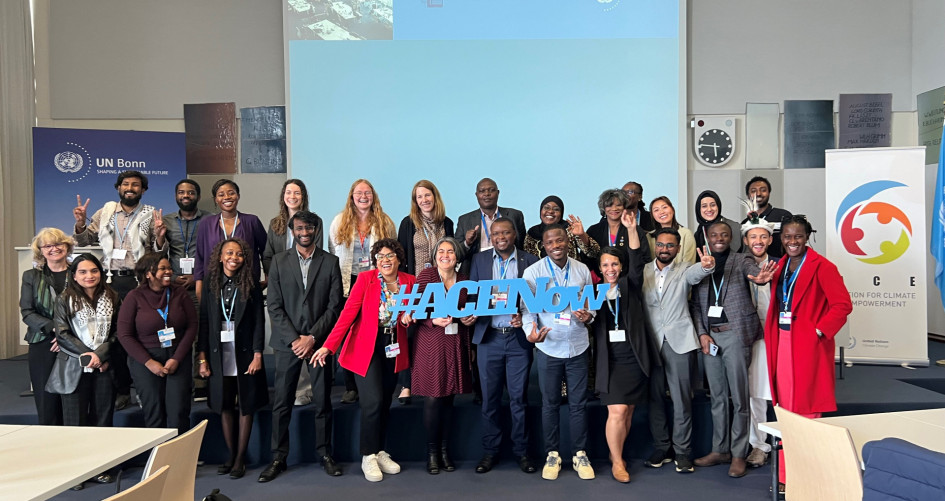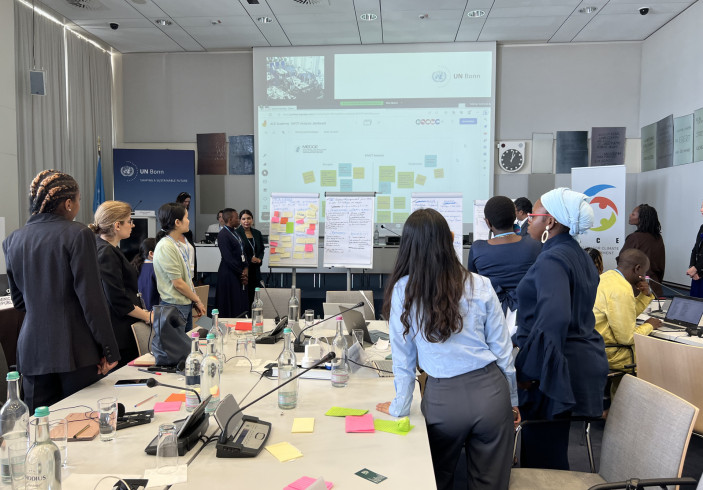Overview
Skills building
Peer - Peer exchange
Networking and strengthening the network of national ACE focal points
|
|
Module 1
20 June 2025
10:00 – 12:30 (CEST)
|
Module 2
20 June 2025
14:00 – 16:30 (CEST)
|
Module 3
23 June 2025
10:00 – 12:30 (CEST)
|
|
Duration: 2-2.5 hour sessions
Focus: Policy Coherence and Coordinated Action
Format: Hybrid
|
The ACE Focal Points Academy was organized as a hybrid event in collaboration with multiple local, regional and international partners. Interpretation in French and Spanish were available via the ZOOM functions.
A variety of training modules were provided based on the needs identified by ACE Focal Points and ACE negotiators. This allowed for countries to showcase good practices and interact with experts in the relevant fields who shared their expertise and answered questions. ACE Focal Points had the opportunity to receive hands on and interactive training and engaged in meaningful discussions through diverse formats such as panel discussions and breakout groups, to allow for discussion of topics at the regional level and across regions.
The ACE Focal Points Academy was organized in three sessions of 2 – 2.5 hours per session on 20 and 23 June 2025 and focused on Policy Coherence and Coordinated Action.
Module 1
Applying intersectional approaches in accelerating ACE implementation: The session laid a foundation for the policy coherence and coordinated action-related skills-building components of the Academy by connecting to the 2025 ACE Dialogue and further strengthening dialogue discussions among national ACE focal points. Moreover, the session helped to unpack the two deliverables discussed during the 2025 ACE Dialogue under activities A.1 and A.2 of the Action Plan of the Glasgow Work Programme on ACE by building the capacity of national ACE focal points in understanding the concept of intersectionality in the context of ACE. .
Module 2
Bridging Voices: Strengthening Collaboration between National ACE Focal Points and Children & Youth from Local Communities and Indigenous Peoples: FWG was invited to provide a 2-hour interactive training session on the LCIPP and to highlight opportunities and good practices for national ACE focal points to ethically and equitably engage with Indigenous Peoples and local communities, especially children and youth in national climate policy making. According to the Glasgow Work Programme (GWP) on ACE, “Parties are further encouraged to build the capacity of youth to embark on and lead ACE implementation and promote youth participation in relevant climate processes at the national and international level, including by including youth in national delegations at UNFCCC meetings” (Decisions 18/CP.26, para. 14). In addition, the Action Plan of the GWP on ACE flags the need to “allow youth to participate in networking sessions and capacity-building workshops for national ACE focal points”, thereby opening up this session to youth from Local Communities and Indigenous Peoples with the aim of promoting dialogue and building skills.
The session was also organized as part of Activity 5.1 of the Collective Approach 5 of the Baku Workplan of the LCIPP. This activity relates to conducting targeted outreach to and engage with national focal points, including but not limited to national focal points to the UNFCCC, loss and damage contact points, adaptation contact points, national gender and climate change focal points and national Action for Climate Empowerment focal points.
Module 3
Engaging local governments, communities and organizations in ACE related initiatives: The objective of the session was to build skills in public engagement and in collaborating within the government at the sub-national level and with various communities and organizations to enhance the efficiency and delivery of ACE policy and programs at all levels. Subnational governments are particularly well placed to identify the needs and strengths of their societies in addressing climate change. Important lessons being learned at the subnational level have the potential to feed into and improve national policy and shape more ambitious and innovative responses to this challenge. Moreover, the session was meant to strengthen the National ACE Focal Points network by encouraging peer-to-peer learning and exchange.
Skills-building: Various skills-building components were integrated into daily sessions to strengthen key skills National ACE Focal Points can utilize in their daily work.
Agenda
Module 1
Friday, 20 June 2025: 10:00 – 12:30 (CEST)
|
Time
|
Topic / Format
|
Facilitator
|
|
10:00 -10:30
|
Opening and Welcome
|
Moderator – Lisa Maina, UNITAR
Joy Mlambo, UNFCCC secretariat
|
|
10:30 - 12:30
|
Applying intersectional approaches in accelerating ACE implementation
|
See session details below
|
Applying intersectional approaches in accelerating ACE implementation
Objectives
Facilitators
Detailed Agenda
|
10:30-10:40
|
Welcome, introductions, quick overview of agenda
|
Alex
|
|
10:40-11:00
|
Understanding power
|
Alex
|
|
11:00-11:30
|
Intersectionality as a concept
|
Alex
|
|
11:30-11:45
|
Introducing the concept of intersectionality
|
Diego
|
|
11:45-11:55
|
Introducing principles for an intersectional approach
|
Angie
|
|
11:55-12:20
|
Applying the principles in education, public awareness, public participation
|
Guided by Alex, with Angie and Diego circulating to support the groups
|
|
12:20-12:30
|
Final reflections, closing
|
Alex
|
12:30 – 14:00 Networking Lunch
Session Materials:
- Power Point Presentation - Survey results to situate ACE Focal Point needs and the Academy agenda + Scene Setting: Academy and linkages to ACE Dialogue. Link here
- PowerPoint Presentation - Applying intersectional approaches in accelerating ACE implementation. Link here
- World Café Outcome: How would you apply the principles for an intersectional approach in activities under the following ACE elements?
1- Education
2- Public Awareness
3- Public Participation
Module 2
Friday, 20 June 2025: 14:00 – 16:30 (CEST)
|
Time
|
Topic / Format
|
Facilitator
|
|
14:00
|
Module introductions
|
Moderator - Isatis Cintrón Rodríguez
|
|
14:00 - 16:30
|
Bridging Voices: Strengthening Collaboration between National ACE Focal Points and Children & Youth from Local Communities and Indigenous Peoples
|
See Session Details Below
|
Detailed Agenda
|
Time
|
Topics and Speakers
|
|
14:00 - 14:30
|
Opening remarks by Robert Karoro FWG Vice Co-Chair
Voices in the room
Local Communities and Indigenous Peoples Platform and its Facilitative Working Group
-
Brief overview of LCIPP and the relevant work undertaken under the Platform by Supriya Dharkar, UNFCCC secretariat (10 minutes)
-
QnA with ACE Focal Points (15 mins)
|
|
14:30 - 15:00
|
Learning from Practice: Case Studies of Curriculum Models
Guiding Question: In what ways are Indigenous knowledge systems and other forms of traditional knowledge being incorporated into both formal and informal climate change education in your country or region?
|
|
15:00-16:20
|
Dialogue: Building Bridges at the National Level
-
Youth-led exercise : Engaging with Indigenous youth and youth from local communities for accelerating ACE implementation
-
Annual Youth Roundtables under the LCIPP – Taily Terena (5 mins)
-
Group Exchange (55 mins):
-
Indigenous youth and youth from local communities: Can you share any lived experiences or case stories that highlight engagement of Indigenous youth and youth from local communities in shaping climate policy and action?
-
ACE Focal Points: How can national ACE-focal points support national-level climate action planning and implementation in ways that reflect the values, worldviews, knowledge systems and priorities of Indigenous youth and youth from local communities?
Three In-person groups (Moderated by Charitie Ropati, Wara Iris Ruiz Condori & Gabrielle Thum)
|
|
16:20 - 16:30
|
Looking Forward: Collaboration through the Baku Workplan of the LCIPP by Robert Karoro, FWG Vice Co-Chair
Closing
|
Session Materials:
- Power Point Presentation: click here
Module 3
Monday, 23 June 2025: 10:00 – 12:30 (CEST)
|
Time
|
Topic / Format
|
Facilitator
|
|
10:00 -10:30
|
Recap of module 1 and 2 and linkages to ACE Dialogue
|
Moderator - Isatis Cintrón Rodríguez
|
|
10:30 -11:00
|
Engaging local governments, communities and organizations in ACE related initiatives
Q&A
|
Karishma Asarpota - ICLEI
Alyssa Chenault - ICLEI
|
|
Peer to Peer Learning
|
|
11:00 -12:10
|
Good practices on policy coherence and coordinated action: models for engaging local governments, communities and youth in ACE related initiatives
-
Sri Lanka - Leel Randeni
-
Trinidad and Tobago – Marcia Tinto
-
Zimbabwe – Tatenda Mutasa
-
Norway - Sigrid E. Valberg
15 minutes each intervention including Q&A segment
|
National ACE Focal Points moderated by Isatis Cintrón Rodríguez
|
|
Next Steps for Action
|
|
|
12:10- 12:30
|
Wrap up session
|
Moderator - Isatis Cintrón Rodríguez
Fleur Newman, UNFCCC secretariat
|
12:30 – 14:00 Networking Lunch
Session Materials:
- PowerPoint Presentation ICLEI. Link here
- PowerPoint Presentation Good practices on policy coherence and coordinated action: models for engaging local governments, communities and youth in ACE related initiatives:
Recommended Resources
Below were suggested pre-readings to the delegates of the ACE Focal Point Academy prior to the event.
Glasgow Work Programme on Action for Climate Empowerment and its Action Plan




